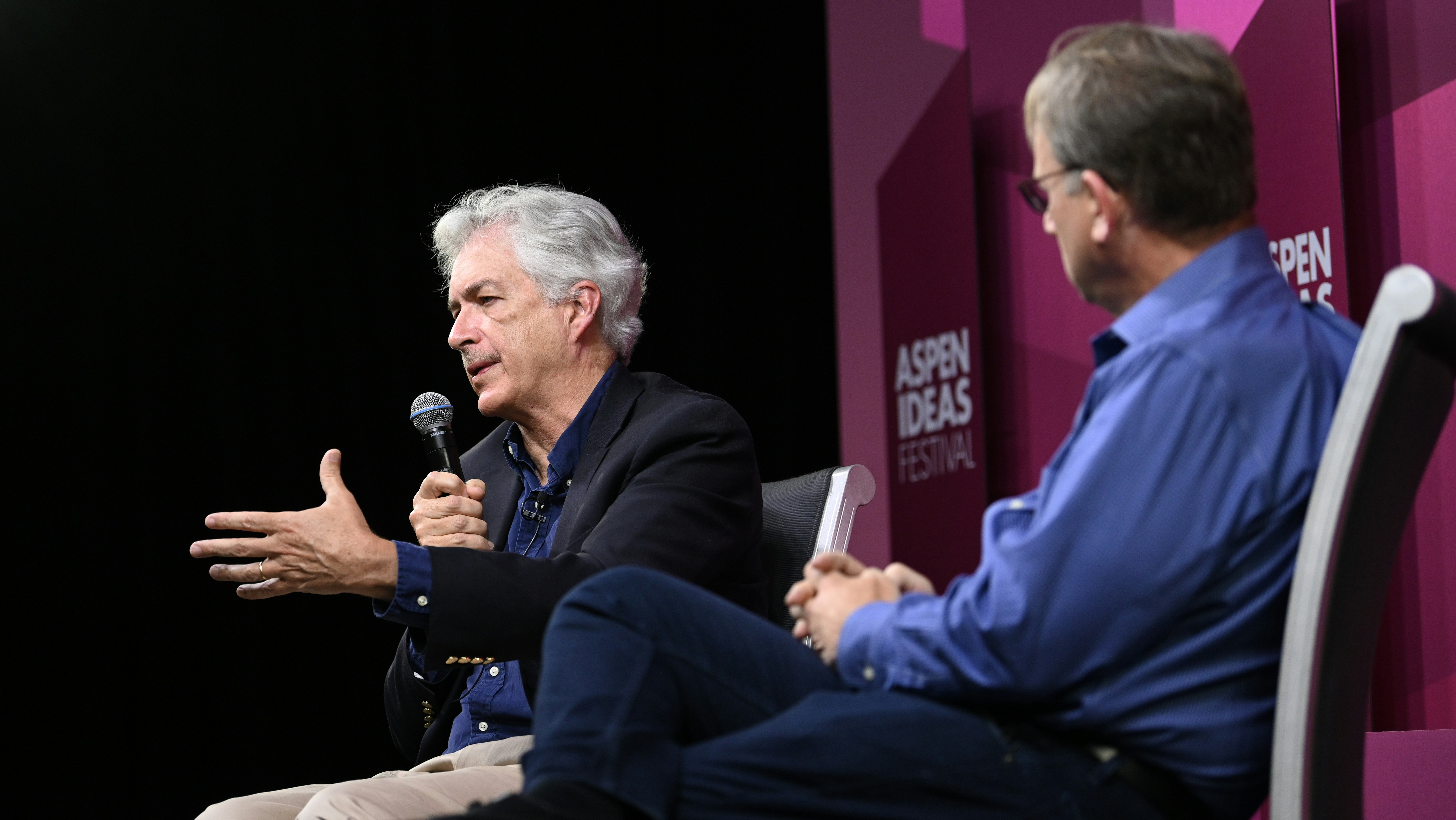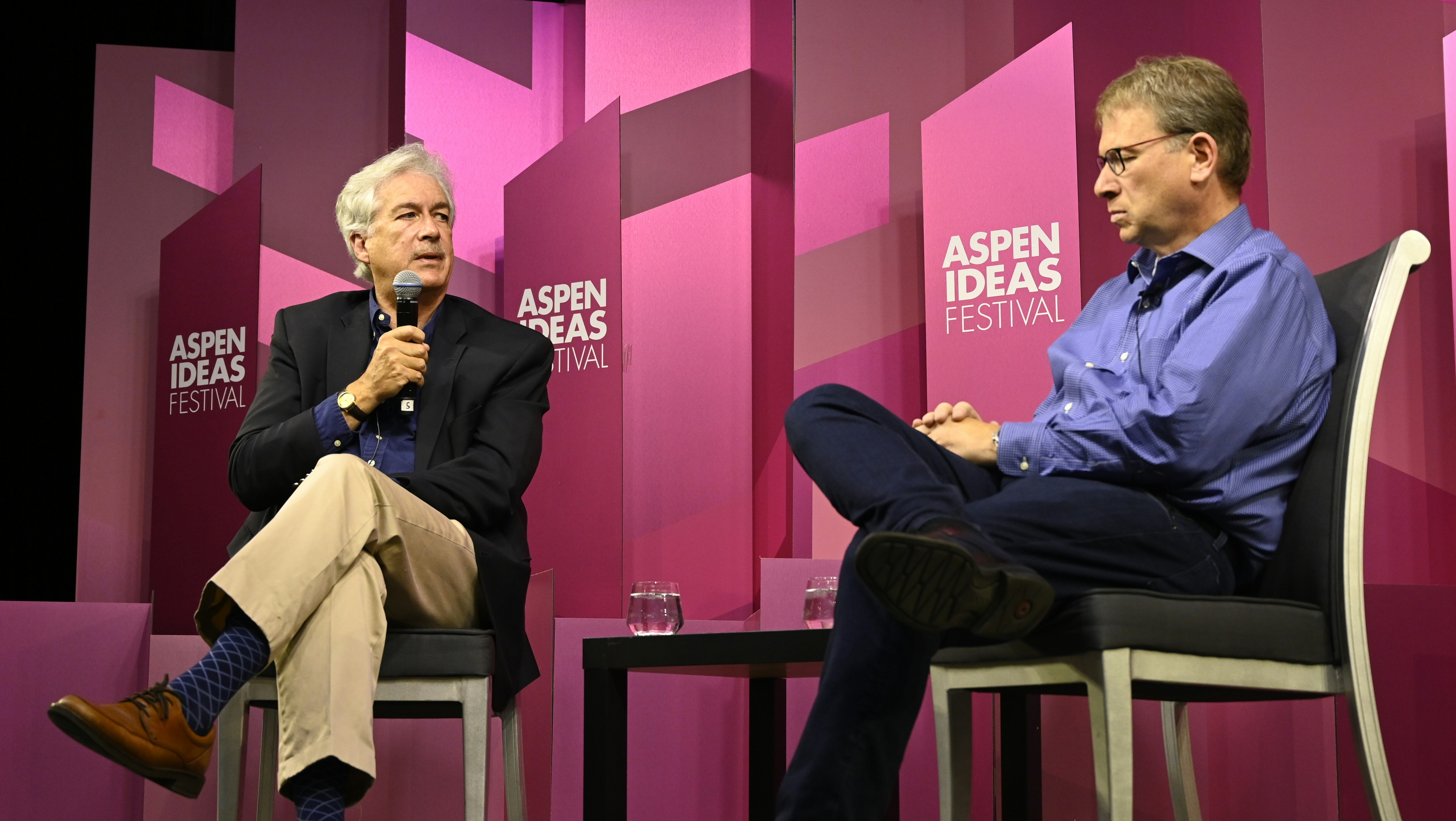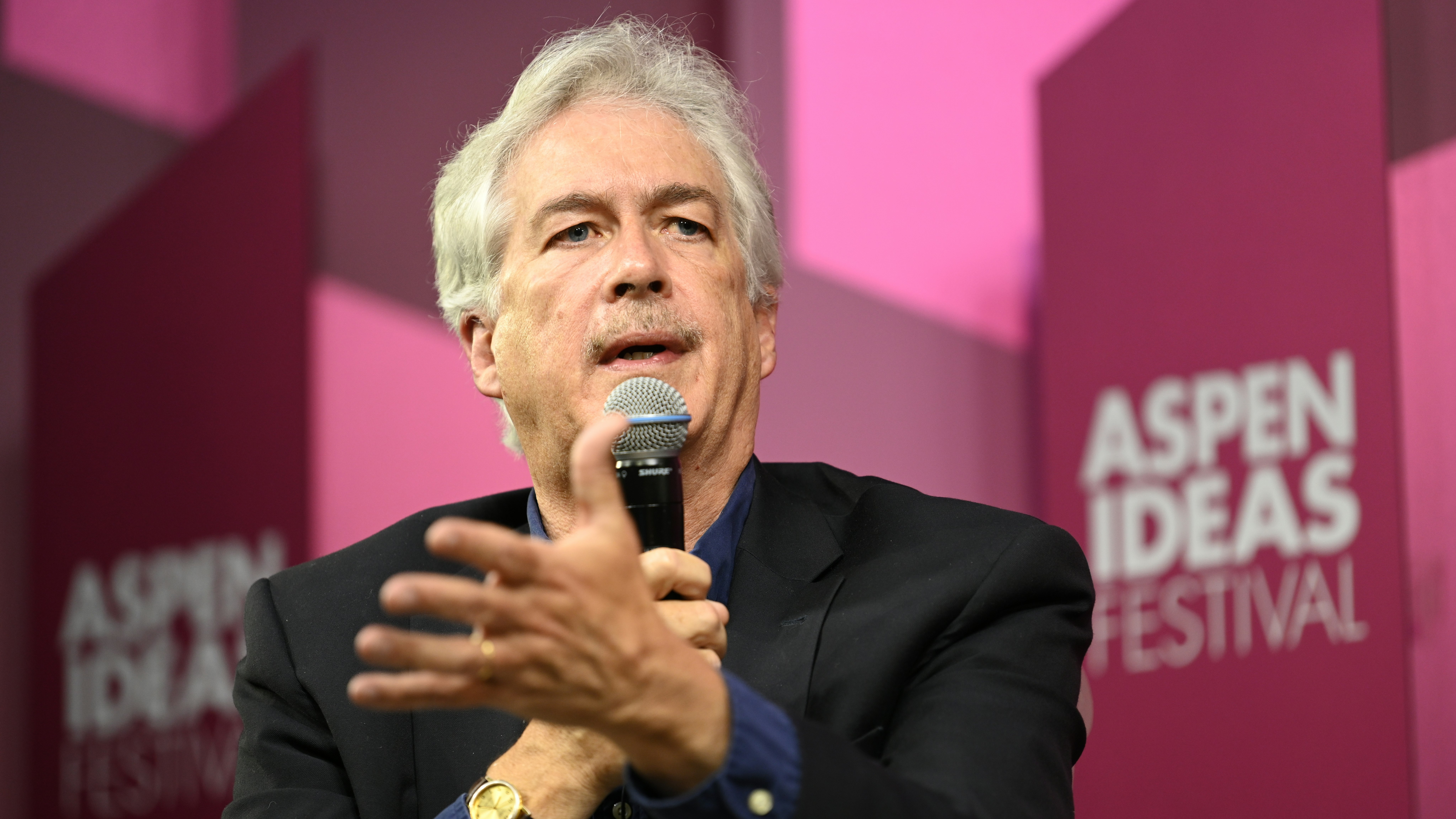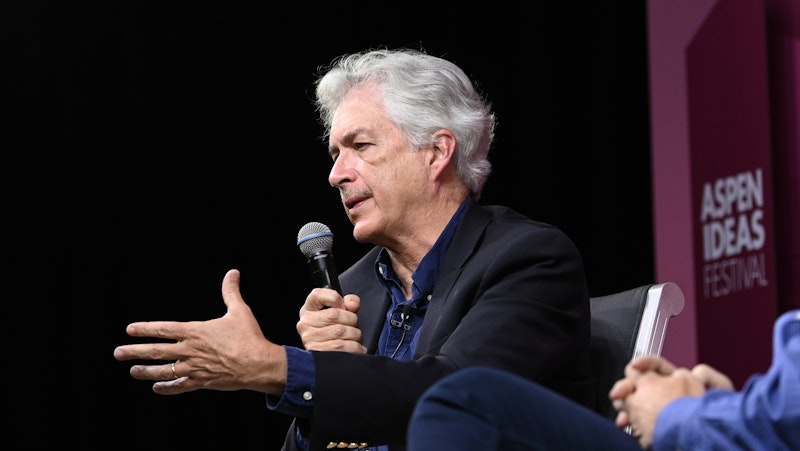
Are We Headed for War with Iran?
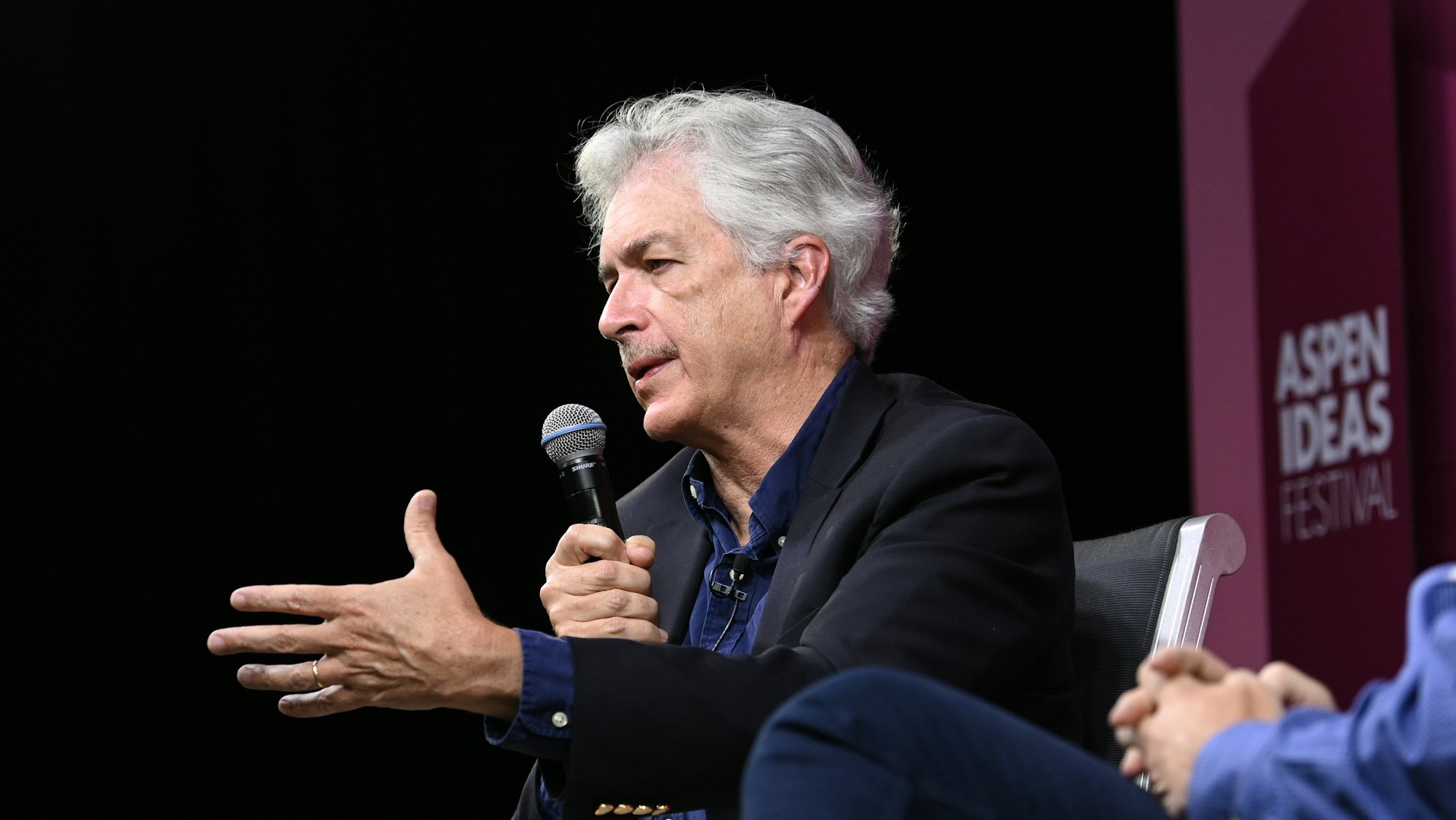
I worry that we’re drifting in the direction of collisions that can escalate very quickly.
Setup
President Trump says he does not want a major war in the Middle East. But many allies and observers worry that hardlinders in the US and Iran are on a collision course toward conflict. The US exit from the Iran deal and the “maximum pressure” campaign have escalated tensions between Washington and Tehran in recent months. Iran has called the announced deployment of US troops to the region “a very dangerous game,” and the alleged involvement of Iran in the oil tanker attacks this summer only exacerbate fears of a military clash, whether by design, by miscalculation, or by accident. The Atlantic’s Jeffrey Goldberg is joined by William Burns, a career diplomat who served five US presidents and led the secret bi-lateral negotiations, that resulted in the Iran Deal.
- 2019 Festival
- World
- Full transcript
It’s not easy, but diplomacy with Iran can see results
Former career diplomat and deputy Secretary of State William Burns claims that although Iran isn’t the easiest negotiating partner, the Iranian regime is receptive to diplomatic overtures. How does he know? He was the lead US negotiator for the 2015 Iran nuclear deal. He describes the fitful, but ultimately successful, diplomatic process leading up to the controversial deal with Iran.
Was the Iran nuclear deal a mistake?
A key factor in understanding the current tensions between Iran and the US stems from President Trump’s decision to not uphold the US’ end of the 2015 Iran nuclear deal. The deal, which incentivized Iran to curtail its nuclear weapons program, was condemned by some as myopic and naive. But are those criticisms warranted? Jeffrey Goldberg, editor in chief of the Atlantic, asks William Burns, one of the chief architects of the deal.
This exchange has been lightly edited for clarity
-

Jeffrey Goldberg: The primary criticisms [of the Iran nuclear deal] in, let's say more hawkish circles, are that the deal is too time constrained. It's unrelated and it does not deal with any of Iran's other malevolent actions in the Middle East. Trump says that these are the reasons that he wanted to get out of the deal. Put Trump aside for a minute. Do you think that the deal was tough enough?
-

William Burns: I think it was the best of the alternatives we could produce at that time. If we could have done a more comprehensive deal that included all of Iran’s threatening behavior in the Middle East, we would have done that. But we weren't going to get our closest European allies, as well as the Russians and Chinese, to agree to really strong international sanctions if the aims were that wide, at least right at the outset. Like any arms control process I've been involved in over the years with the Soviets and with the Russians, these aren't one-off agreements. You build on them over time. And so our expectation always was with this nuclear agreement with Iran that we were then going to have to build on it to try to extend the timelines in terms of some of the constraints on Iranian capacities to push back in other areas in the Middle East. We were just in a better position to do that. When we had united most of the international community around that set of goals, we were in a better position to deal with all of those other threatening Iranian actions.
Madman diplomacy under Trump is damaging and dangerous.
Madman diplomacy — acting irrationally and volatile towards a foreign adversary to theoretically dissuade opponents from eliciting unintended consequences — only works if it’s part of a larger strategy, says William Burns, and President Trump’s unpredictability towards Iran is both the means and the end.
Burns sees Trump’s erratic behavior towards Iran (and other world powers) as immediately dangerous. He worries that a US that can’t be trusted on the world stage will erode its foreign influence in the long term.
What does Iran want?
Iran is sometimes portrayed as an irrational actor with a bad temper, but this facile view of the Iranian regime distorts meaningful discussion (and diplomacy). William Burns says that the Iranian government, above all else, seeks the survival of the current regime. Additionally, Burns says Iran wants what most other countries want: to be a principal actor in their geographic region.
How It Works
Burns also contends that, while we shouldn’t underestimate the Iranian regime, its internal desires may have set itself up for disaster. With 70 percent of the population under 30 and an anemic economy, Iran may face challenges from its own citizens as it pursues potentially unpopular strategies abroad.
A conflict between the US and Iran is alarmingly possible
Jeffrey Goldberg wants to know if there’s any predictions William Burns can make about where our relationship with Iran is headed, and Burns says that he’s pessimistic.
Learn More
Additional Information
Explore More
World


The world seems to be moving and evolving faster than ever before, and democratic ideals are under threat in many countries around the globe. New York Times columnist and jour...

The international community faces unprecedented threats. What will geopolitical arrangements look like going forward? Is it time to rethink America’s relationship with China?...


Populations around the world have been electing more and more autocratic leaders in the past couple decades, via supposedly free, fair, and democratic elections. The freedom o...

At the 2023 Aspen Ideas Festival, we dug into some of the most important and fascinating issues of our time, from rebuilding trust in our institutions and the promise and peri...

In this new Aspen Ideas format, all attendees gather each morning to kick off the day by exploring a current issue of deep complexity. With heightened political tensions an...

With the dream of the Oslo Accords long in the rear-view mirror and no prospect of an agreement between Israelis and Palestinians ahead, is it time to give up on the two-state...

In this new Aspen Ideas format, all attendees gather each morning to kick off the day by exploring a current issue of deep complexity. For decades, American policy regardin...

How fast can the world really move off hydrocarbons, and are we underestimating deep macroeconomic analyses of the energy transition in our policymaking? Two financiers delve...

The war in Ukraine has once again highlighted the importance of international alliances, and that is certainly evident on the African continent, where the world’s superpowers...

As Israel marks its 75th birthday, the existential challenges it faces don’t only come from geopolitical vulnerabilities. How will the Jewish state confront internal divisions...

Hostage-taking presents nations with a conundrum: How can governments bring their citizens home while also preventing further captures? The United States’s top hostage negotia...

The Afternoon of Conversation is the Aspen Ideas Festival's pinnacle programming moment. Over 2,000 people gather in the Benedict Music Tent, an open-air venue with acoustics...

With renewed conflict on the international stage, India’s decades-long policy of nonalignment, together with its surpassing China as the most populous nation, have arguably po...

Ongoing war in Ukraine and the resulting tensions between the West, Russia, and China have made the NATO alliance all the more significant, and yet perhaps more vulnerable. Wh...

Since the dawn of the Olympics, sports have been a contest of global powers. Today, how are sports used as a means of conducting foreign policy — for better and for worse?

Across the globe, free and fair elections have given rise to autocratic regimes. Have we underestimated the fragility of democracy and overestimated its value? (Book signing w...

Does going electric mean buying lithium from Russia and Venezuela? What happens if the United States takes carbon action while competitors don’t? Experts weigh in on the geopo...
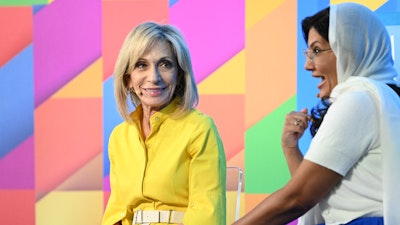
The festival kicks off with thought leaders sharing fresh ideas about bridging divides, having better conversations, and encouraging creativity. A conversation with Saudi Arab...


We are in a golden age for organized crime and corruption, according to watchdog groups. Bad actors have spent decades building tangled webs of enablers and tactics, and they...

Russia launched its invasion of Ukraine in February 2022, and since then, the war has proven longer and costlier than what the Kremlin might have expected. Ukrainian resistanc...









